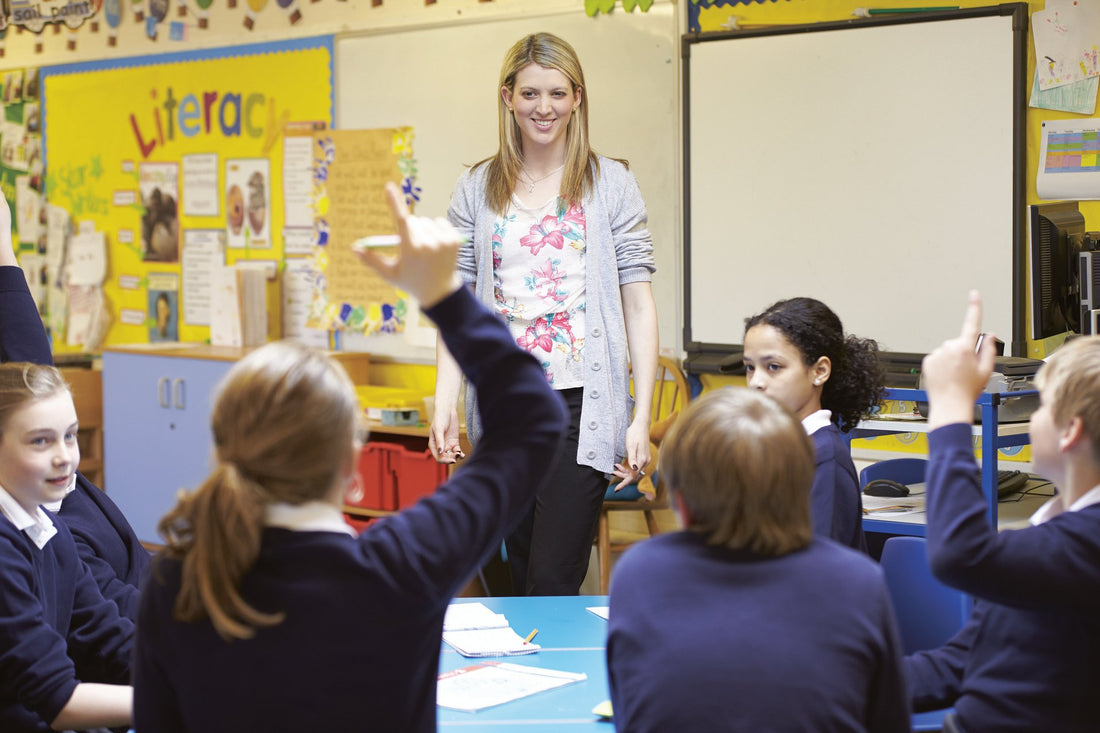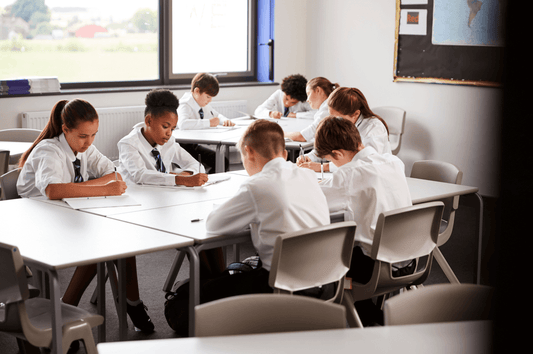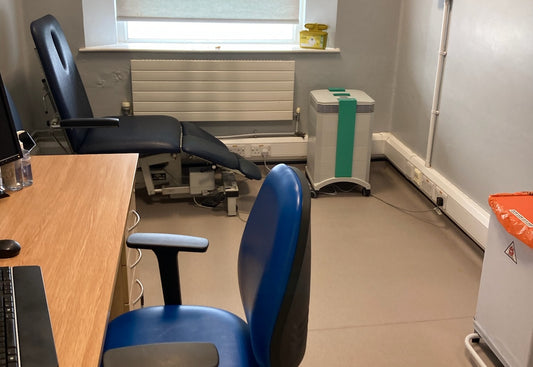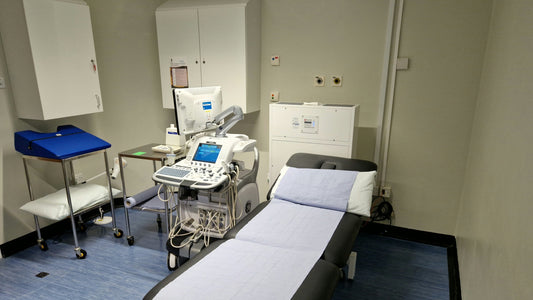Here we explore the benefits of adopting effective air cleaners for schools, alongside recommended measures such as social distancing, hand washing and face mask use. Effective air filtration can help provide protection against Covid-19 and improve indoor air quality more broadly.
Why are air cleaners for schools important?
Over the course of the COVID pandemic in 2020 and 2021, we have learned more and more about the ways in which Covid-19 is transmitted. In July 2020, the World Health Organization (WHO) acknowledged that the virus can be passed on through aerosols, particularly in indoor settings with poor ventilation.[i]
Thus, it is important that schools and other educational settings take steps to provide safe learning environments for their pupils and staff. This includes taking action to mitigate the risk of viral transmission in schools.
The Royal College of Physicians (RCP) and Royal College of Paediatrics and Child Health (RCPCH) recently highlighted the need to consider the impact of low indoor air quality in homes and schools on health. They highlighted that air pollution is linked to increased risk of asthma and allergies, impaired cognition, impaired lung and cardiovascular development, possible gene changes and disease associated with ageing. Regarding schools, the RCP and RCPCH recommended actions to ensure adequate ventilation and that ventilation systems are regularly maintained, noting that use of high-grade air filters in higher polluting areas may be beneficial.[ii]
The UK Government had originally been hesitant to officially recommend air purification systems for indoor environments in 2020. This was understandable, as the market for air cleaners in the UK is currently unregulated and there are many products available which make misleading and sometimes false claims about the air cleaners' performance. Nevertheless, high-quality High Efficacy Particulate Air (HEPA) filters - which are classified according to the EN1822*, certified and guaranteed leakage free - have been used in the most sensitive environments for decades and can provide significant protection from airborne viruses and pollutants in the ambient air if installed correctly.
Protecting children from Covid-19 and general air pollution in schools
Effective air cleaners is schools use HEPA filters to successfully capture virtually all airborne particulate contamination that goes through the air purifier's filters. Respiratory viruses and bacteria can effectively be filtered from indoor air using these technologies, including SARS-CoV-2, which measures between 0.25 and 1.0 μm in diameter.[iii]
In addition to removing viruses and bacteria from ambient air, HEPA filters are also effective in reducing traffic pollution, which has been a significant concern when air pollution penetrates into the school buildings, and therefore effect the air in school classrooms.
In 2020, a pilot trial was conducted with two schools in South West London. It assessed the impact of installing the IQAir Cleanzone SL air purifiers in classrooms and found a reduction of up to 96% of particulate pollution compared to outdoor pollution levels. Following the study period, the schools’ owner commented:
“We could immediately see the improvement in air quality throughout the schools, measured and visible in real-time, and with no inconvenience caused within the classes. This has provided reassurance to both the teachers and to parents that their children's respiratory health is being given the best protection through cleaner filtered air when attending our schools.”
The results of a different study conducted by Hounslow Council in a West London school found that the IQAir system demonstrated a removal effectiveness of up to 88% for both PM10 and PM2.5.
How have other countries utilised air cleaners in schools?
The German Federal Environment Agency published guidance in August 2020 highlighting that the use of consistent ventilation technologies indoors can significantly reduce the risk of Covid-19 transmission, when used in conjunction with general hygiene and distancing advise.[iv]
The Federal Institute for Occupations Safety and Health similarly notes that use of professional air cleaners can be a sensible technical solution to controlling indoor air contamination. Particularly for rooms with high occupancy density and when combined with ventilation measures that supply outdoor air.[v]
In rooms with high occupancy such as school classrooms, the Agency noted the importance of effective airflow monitoring, alongside targeted placement of appropriate ventilation device, to ensure adequate protection. This can be achieved through monitors such as the IQAir AirVisual Pro air quality monitor, which can indicate where additional ventilation is needed, and in conjunction with the IQAir high-performance air purifier to monitor improvements in indoor air quality.
As a result of this guidance, the German Government has invested €500 million in 2021 to improve ventilation systems in public buildings such as offices, museums, theatres, universities and schools, with funding also available for C02 sensors which indicate when indoor air quality is lacking oxygen.[vi]
This is an important and welcome step in reducing Covid-19 transmission and improving air quality in indoor environments.
Conclusion
The IQAir high-performance air purifiers have been tested according to EN1822 and show an absolute minimum filtration efficiency of 99.5% for any particulate pollution, regardless of size and speed setting the unit is used on. The IQAir air filtration for schools are also individually tested, certified and guaranteed for their high filtration efficiency. Thus, the IQAir air purifiers can be used as an effective supplemental measure to protect against Covid-19 and exposure to indoor air pollutants in schools.
The IQAir AirVisual Pro air quality monitor provides much-needed information to determine when ventilation is required and how to best utilise an professional air purifier. These systems can support schools to provide safe environments for their students and form an important part of the national Covid-19 response by helping to reduce transmission and infection.
*For more information on the EN1822 test, please see our article available EN1822 Classification - Why it matters.
[i] World Health Organization. Transmission of SARS-CoV-2: implications for infection prevention precautions. July 2020. Available:
[ii] Royal College of Physicians and Royal College of Paediatrics and Child Health. The inside story: Health effects of indoor air quality on children and young people. January 2020.
[iii] Zhao B et al. Air purifiers: A supplementary measure to remove airborne SARS-CoV02. Building and Environment. June 2020.
[iv] Federal Environment Agency. August 2020.
[v] Federal Institute for Occupational Safety and Health. Ventilation in accordance with infection control - Instructions and measures in times of the SARS-CoV-2 epidemic. September 2020.
[vi] Federal Ministry of Economic Affairs and Energy. To curb the spread of COVID-19: €500m for ventilation equipment in public buildings and places where people meet. October 2020.




